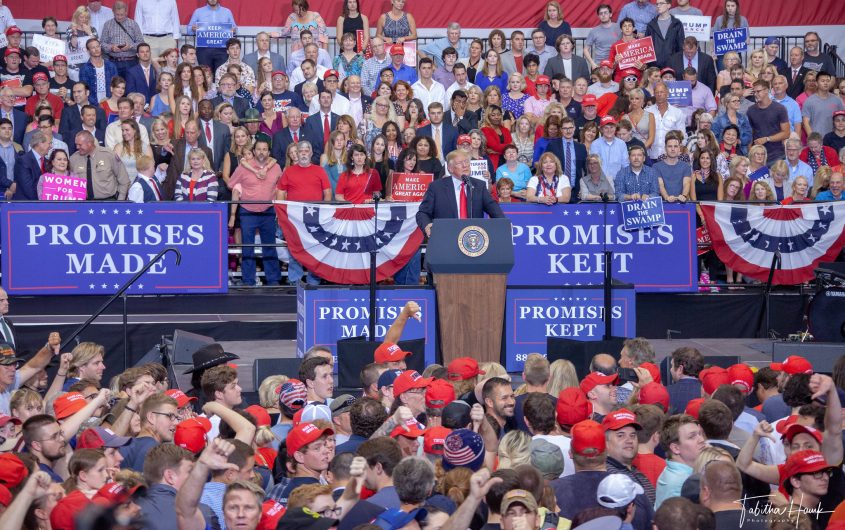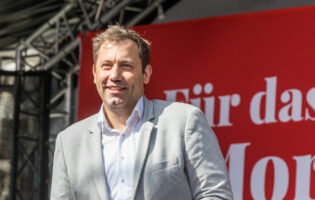
Tabitha Kaylee Hawk via Flickr
Will There Be a German Trump?

Stephen F. Szabo
Senior Fellow
Dr. Stephen F. Szabo is a Senior Fellow at AICGS, where he focuses on German foreign and security policies and the new German role in Europe and beyond. Until 2017, he was the Executive Director of the Transatlantic Academy, a Washington, DC, based forum for research and dialogue between scholars, policy experts, and authors from both sides of the Atlantic. Prior to joining the German Marshall Fund in 2007, Dr. Szabo was Interim Dean and Associate Dean for Academic Affairs and taught European Studies at The Paul H. Nitze School of Advanced International Studies, Johns Hopkins University. He served as Professor of National Security Affairs at the National War College, National Defense University (1982-1990). He received his PhD in Political Science from Georgetown University and has been a fellow with the Alexander von Humboldt Stiftung, the Woodrow Wilson International Center for Scholars, and the American Academy in Berlin, as well as serving as Research Director at AICGS. In addition to SAIS, he has taught at the Hertie School of Governance, Georgetown University, George Washington University, and the University of Virginia. He has published widely on European and German politics and foreign policies, including. The Successor Generation: International Perspectives of Postwar Europeans, The Diplomacy of German Unification, Parting Ways: The Crisis in the German-American Relationship, and Germany, Russia and the Rise of Geo-Economics.
Germany has been a model country for decades overcoming a dark past. Contemporary Germans have learned the lessons of their history and have resisted the temptations of a resurgent nationalism sweeping the world. Yet how immune can any country be to the tempests swirling around it? How will Germans adapt to the zero-sum transactional world that is replacing the long peace of the past seventy years? How can Germany continue to be a multilateral post-national country when the world order that promoted this approach is dying? What are the prospects for a German Trump in the next decade?
How can Germany continue to be a multilateral post-national country when the world order that promoted this approach is dying?
Germany has had many buffers to a new nationalism, both of an international and domestic nature. Internationally NATO and the European Union have been critical to the development of a post-national and multilateral strategic culture. However, Germany is clearly the Western country most vulnerable to this change in the international world order. It is a trading state par excellence, heavily dependent on exports and current accounts surpluses, which undergirds its democratic order and foreign policies. The return to bilateral trade treaties and nationalist economic relations along with the moves by the Trump administration, Russia, and China to undermine NATO and the European Union will put increasing stress on Germany’s multilateral approach. Germany is also vulnerable on defense as it has underspent and neglected its own security, relying on the American umbrella. It now faces the beginnings of a new debate on German national defense, even eventually including one on an independent German nuclear deterrent.
On the domestic side, the Vergangenheitsbewältigung or confrontation with the past, has checked nationalist reflexes, as has the prospect of encircling coalitions against a resurgent Germany within Europe. However, there are now many generations of Germans who are far removed from the Holocaust, including those socialized in what was East Germany (GDR) in a political culture that transferred guilt to the West. The rise of the Alternative for Germany (AfD) is a symptom of the loosening of the historical constraints on German identity and the continuing legacy of the old GDR. German economic success, in contrast to the Weimar Republic, allowed democracy to take root but has also resulted in a form of arrogance or hubris that sees the German Way as not only the best, but also the most moral, as demonstrated during the Greek eurozone crisis.
The Merkel years have been characterized by a form of a Germany First parochialism that defends a narrowly-defined set of German interests with little regard for providing a broader public good.
The Merkel years have been characterized by a form of a Germany First parochialism that defends a narrowly-defined set of German interests with little regard for providing a broader public good. This era of Grand Coalitions can be seen as a transitional phase of Swiss-like parochialism to a more assertive, if defensive, nationalism. In addition, the Merkel legacy in fiscal policy and its stubborn clinging to the Schwarze Null non-deficit policy has opened Germany up to serious economic problems in the near to mid term. The underinvestment in digitalization and infrastructure combined with a coming crisis in the automotive sector and a looming trade war will result in an economic recession that will open the door wider to anti-democratic forces.
Germans have been averse to anything resembling charismatic leaders after the Hitler experience, but this will change in an era of “strong men” leaders. How long will Germans accept the uncharismatic coalition type of leadership offered by Merkel in this new age? How will the generations born not only since the end of WWII, but since the fall of the Berlin Wall, react to this new environment? What would a German Trump look like?
How long will Germans accept the uncharismatic coalition type of leadership offered by Merkel in this new age?
He, as it is most likely to be a he, will be young, from a generation socialized since Germany unified. He will come from the right and will appropriate many of the arguments popularized by the AfD, including a tough line on the eurozone, immigration, and law and order. He will capture the Christian Democratic party the way Trump has captivated the Republicans and, like Trump, will have built upon a political culture looking for this type of leader. He will use social media to go around the more established press and will intimidate ARD and ZDF the way that Boris Johnson is attacking the BBC by going after the public fee structure that finances these networks. He will get support from Bild Zeitung and the tabloid press. A German version of Fox News is likely to follow.
In foreign policy this new German leader will, in Freudian terms, kill the father, and will be anti-American, lashing out at the resentments built up against Trump and against the lasting dependence of Germany on the U.S. This new nationalism could see a defense build-up based on a return to a new militarism, but a shift in German foreign policy toward accommodation with Russia is more likely. Given the devaluation of liberal values in this zero-sum world, German policymakers will opt for a more openly geoeconomic approach that puts national economic interests above concerns for democratic values and human rights. The Schröder and Merkel years already presaged this approach first toward Russia and then China. Unlike other European populists, German leaders will continue to support the EU given the need for the critical mass provided by the EU to deal with the Great Powers and it will continue to rely on the large single market it provides. But this will be a German Europe, not a European Germany, which will use its economic dominance to ensure a compliant EU enhanced by the departure of the UK and the continued weakness of France and Italy.
All this will result in a world most Germans today would not wish for but one to which they may have no choice but to adapt. This is a problem for Germany—not a problem caused by Germany. As the fate of nations rests not only on domestic factors but is shaped by a changing external environment, only a reinvigorated EU led by a European Germany can prevent this dark future.









